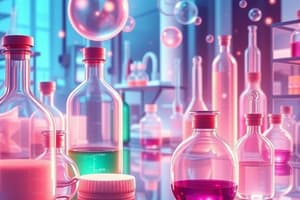Podcast
Questions and Answers
What type of acid is HNO3?
What type of acid is HNO3?
- Triprotic acid
- Weak acid
- Monoprotic acid (correct)
- Diprotic acid
How is H3PO4 commonly prepared?
How is H3PO4 commonly prepared?
- Contact or catalytic process (correct)
- Direct combination of hydrogen and phosphorus
- Oxidation of phosphorus
- Electrolysis
What is the characteristic odor of HNO3?
What is the characteristic odor of HNO3?
- Highly irritating odor (correct)
- No odor
- Pungent odor
- Sweet odor
What is the percentage range of H2SO4 in its aqueous solution?
What is the percentage range of H2SO4 in its aqueous solution?
What is the color of H3PO4?
What is the color of H3PO4?
Flashcards are hidden until you start studying
Study Notes
Pharmaceutical Aids and Necessities
- Important for the preparation, prevention, and storage of pharmaceutical products
Acids and Bases
- Inorganic acids:
- Boric acid (H3BO3)
- Phosphoric acid (H3PO4)
- Hydrochloric acid (HCl)
- Nitric acid (HNO3)
- Sulfuric acid (H2SO4)
Boric Acid
- Also known as "boracic acid", "hydrogen borate", or "orthoboric acid"
- Physical properties:
- Colorless, odorless pearly scales or white odorless powder
- Uncutuous to touch, with a soapy feeling
- Solubility:
- Soluble in water and alcohol
- Freely soluble in glycerin, boiling water, and boiling alcohol
- Uses:
- Antiseptic and weak bacteriostatic agent in solutions, ointments, and dusting powder
- Eyewash (2.5-4.5%)
- Buffer in ophthalmic solutions and preparations
- Important note: Not to be taken orally
Hydrochloric Acid (HCl)
- Also known as "muriatic acid", "spirit of sea salt", or "marine acid"
- Physical properties:
- Colorless fuming liquid with a pungent odor
- Concentration: 36-38% HCl
- Uses:
- Acidifying agent that reacts with organic molecules to form "hydrochloride" salts
- Diluted HCl is similar to gastric juice (about 0.5%)
Studying That Suits You
Use AI to generate personalized quizzes and flashcards to suit your learning preferences.




